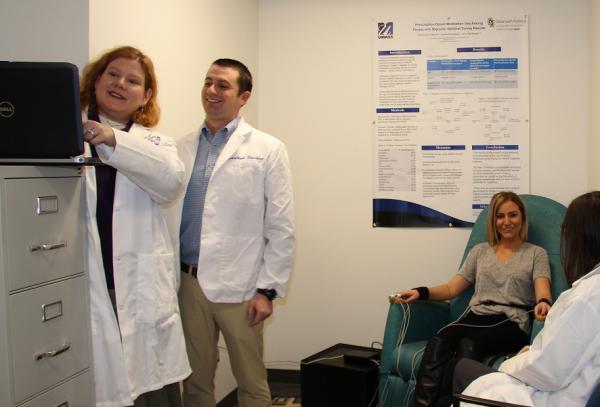Current Lab Research
STOP Study
This NIH and NIDA (National Institution on Drug Abuse) funded study is developing and testing a psychotherapy treatment that addresses the needs of patients with comorbid pain and opioid addiction. The treatment is a twelve-week group therapy protocol that educates patients on Cognitive Behavioral techniques, as well as, self-regulation practices to assist in their pain management. This treatment is paired with various biofeedback interventions including, cold pressor tasks, and biodots.
link to Facebook page: https://www.facebook.com/opioidstopstudy/
I-STOP Study
An ongoing National Institutes of Health (NIH) and National Center for Complementary and Integrative Health (NCCIH) funded clinical trial based on our successful outpatient STOP protocol that is modified for in an inpatient or intensive outpatient setting. This eight-week group therapy research study uses cognitive behavioral, and self-regulation practices to identify if we can improve pain management and reduce opioid cravings. This novel treatment integrates biofeedback and exercise interventions to help patients maintain healthy lifestyle choices during substance use treatment.
I-STOPS Study
This NIH- NCCIH funded supplement study utilizes a mixed-methods approach to explore the potential impact of stigma on patients during residential drug treatment via quantitative and qualitative measures. Residential treatment center healthcare providers and staff have the opportunity to complete online questionnaires coupled with an Implicit Association Task (IAT) and a semi-structured interview. Individuals completing residential drug recovery treatment for a substance use disorder are also asked to complete a semi-structured interview. The goal of this research is to assess for vertical and horizontal forms of stigma in inpatient treatment settings in order to improve treatment outcomes for patients with pain and opioid use disorder.
6BB+BH Study
The 6 Building Blocks + Behavioral Health Integration is part of the Practice Innovation Program at the University of Colorado School of Medicine (PIP@CU) and the Colorado Community Health Network (CCHN). Funded by the Centers for Disease Control (CDC) and Colorado Department of Public Health and Environment (CDPHE) this study proposes to use tele-education for primary care medical providers and integrated behavioral health providers to: 1) increase utilization of behavioral health interventions for patients with chronic pain and 2) support implementation of opioid prescribing guidelines to decrease risky opioid prescribing for chronic non-cancer pain.
Previous Research
Childhood Migraine Study
Previous lab members Joseph McNabb and Paige Barrette completed a journal article investigating the relationship between migraine age of onset and adult migraine patterns. Additionally, Joseph MacNabb, Paige Barrette, and Daniel Hernandez Altamirano worked on a study analyzing the impact that migraine diagnosing delays have on the adulthood migraine condition and the individual’s quality of life. They assessed what factors may be causing these delays, like parental barriers or healthcare disparities.
Pain and Sleep
In this project we analyzed data from Dr. Wachholtz’ NIH grant examining the psycho-physiology of patients with comorbid pain and opioid addiction.
Bio-psycho-social-spiritual  Concepts of Health and Well-being
Concepts of Health and Well-being
In collaboration with international colleagues, this study examined how concepts of health and well-being are altered inter-generationally with immigration to the United States and how these concepts differ among cultures.
Improving Quality of Life for Palliative Care Patients
Through multiple studies, articles, and book chapters, Dr. Wachholtz’s work in this area focused on differentiating among the many aspects of pain that can impact the patient pain experience in palliative care and to improve assessment and treatment for multidimensional pain.
